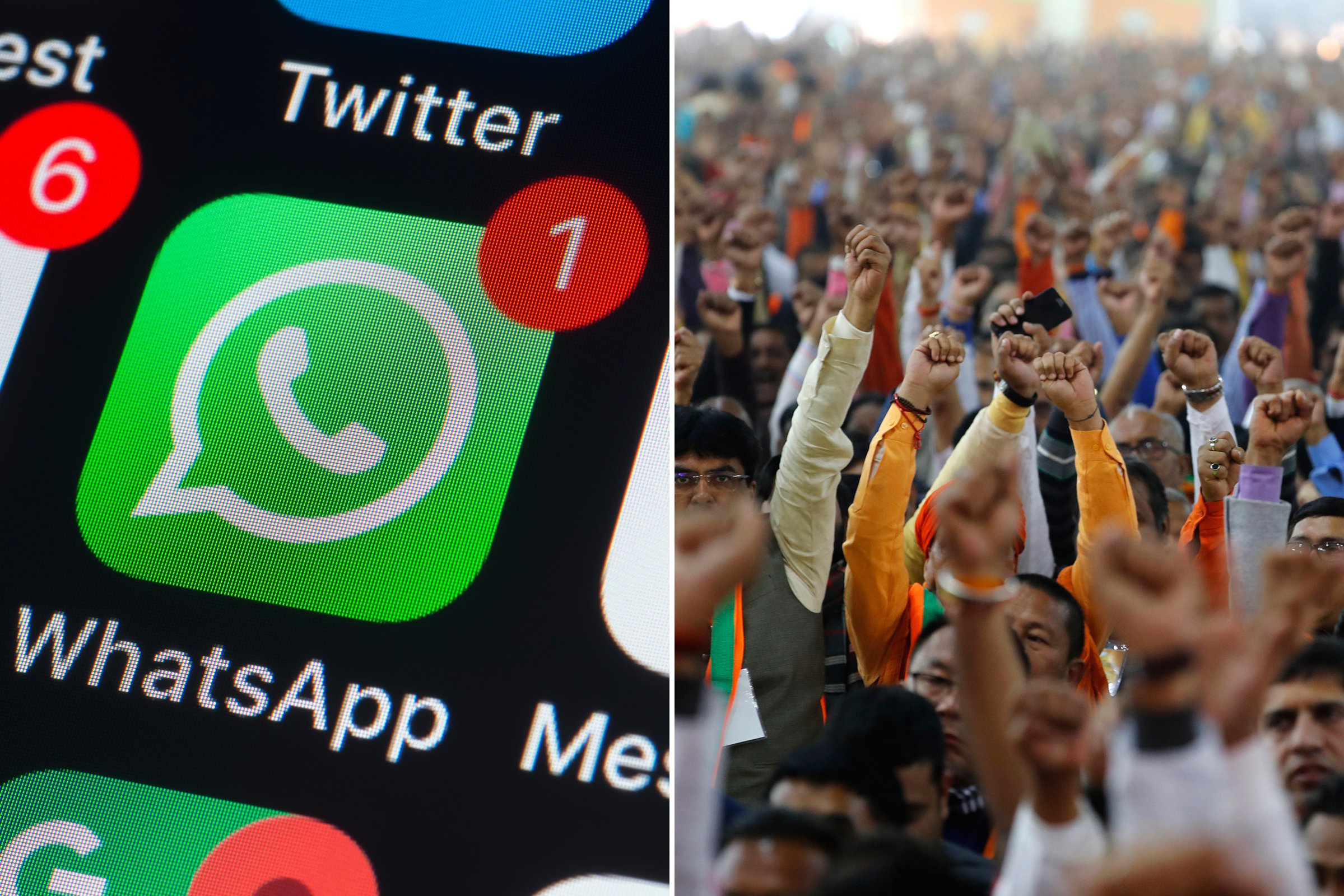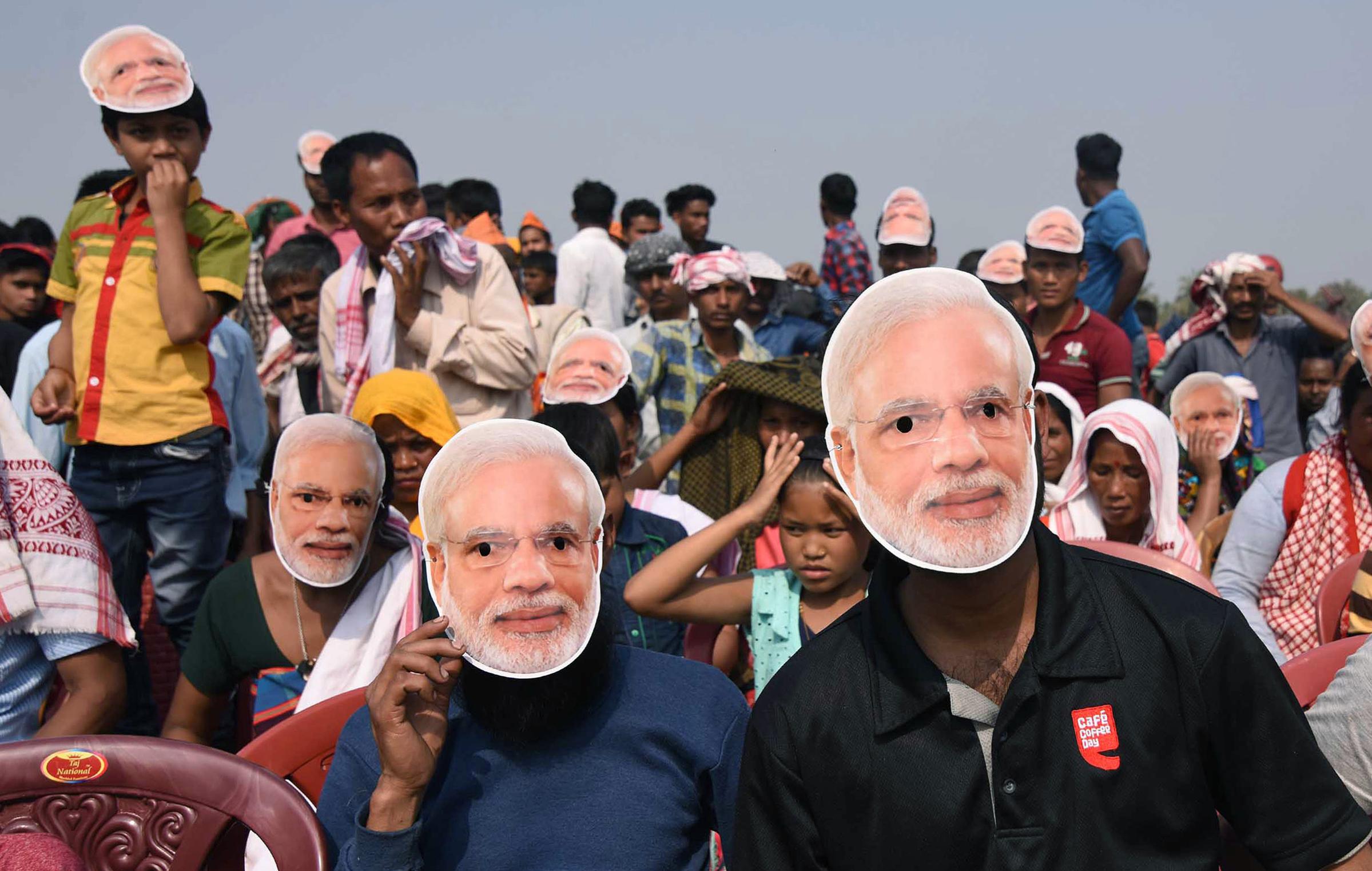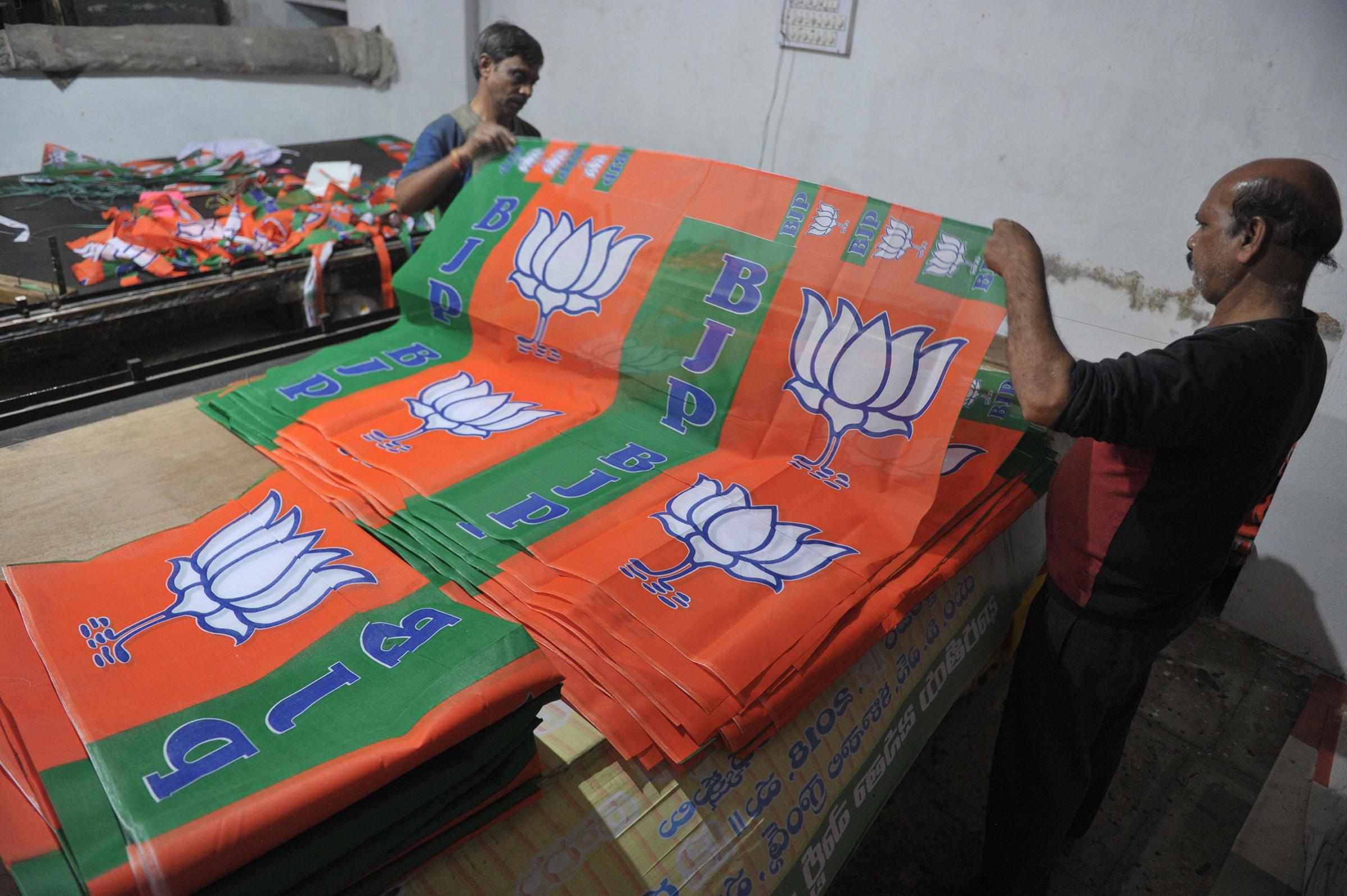
On Monday, in an effort to stop the spread of fake news, WhatsApp announced that users around the world would only be allowed to forward messages to a maximum of five contacts or group chats, down from a previous limit of 20.
But in India, where that same policy has already been in place for six months, activists and academics say it has done little to curb the spread of misinformation in the world’s biggest democracy.
Ahead of national elections in April and May, India’s political parties are pouring money into creating hundreds of thousands of WhatsApp group chats to spread political messages and memes. Prime Minister Narendra Modi’s ruling Bharatiya Janata Party (BJP) has drawn up plans to have three WhatsApp groups for each of India’s 927,533 polling booths, according to reports. With each group containing a maximum of 256 members, that number of group chats could theoretically reach more than 700 million people out of India’s population of 1.3 billion.
In reality, the number is likely to be smaller because many people are in multiple group chats, and most chats have fewer than 256 members. But the strategy reflects a fundamental change in Indian society: at the time of the last national polls in 2014, just 21% of Indians owned a smartphone; by 2019, that figure is thought to have nearly doubled to 39%. And for most of them, WhatsApp is the social media app of choice — by one count, more than 90% of smartphone users have it installed. In recognition of that shift, the BJP’s social media chief declared 2019 the year of India’s first “WhatsApp elections.”
But according to researchers, as well as screenshots of group chats from as recently as January seen by TIME, these WhatsApp group chats frequently contain and disseminate false information and hateful rhetoric, much of which comes from forwarded messages. Experts say the Hindu nationalist BJP is fueling this trend, although opposition parties are using the same tactics.
“There is an army of volunteers whose job is to sit and forward messages,” says Soma Basu, a fellow at the Reuters Institute at Oxford University, who is researching the spread of hate messages on WhatsApp group chats in India. “The volunteer is not able to forward a message to 20 people in one go” any more, she says. “So they’ll just do it five times.”
That limit was introduced in July, after a spate of violence in early 2018, when rumors about child kidnappers, forwarded from person to person and group to group, fueled mass hysteria mainly in rural towns and villages across the country. In one incident in the state of Maharashtra, five people from a nomadic group were killed by a mob after rumors spread on the app about a child-abducting gang being active in the area. In all, at least 30 people were lynched in what came to be dubbed “WhatsApp Killings.” In response, WhatsApp reduced the number of contacts or groups a user could forward a message to from 100 down to five in India, and 20 globally. (A WhatsApp spokesperson told TIME that during testing of the forwarding-limit, the company saw a 25% reduction of forwarded messages being shared.) In addition, WhatsApp added a “forwarded” label to passed-on messages.
Even so, WhatsApp still finds itself playing catch-up. In the Brazilian election in October 2018, the company banned hundreds of thousands of accounts; it is now doing the same in India. “WhatsApp is stepping up our efforts to ban accounts engaging in sending spam ahead of elections,” a company spokesperson told TIME. “We will continue to take steps to preserve the private nature of the app, such as limiting viral content and banning accounts engaging in spam.”

The challenges faced by WhatsApp are not limited to misinformation, but also the exploitation of personal data for political ends — an issue that gained widespread attention after the Cambridge Analytica scandal in 2018.
TIME spoke to a former BJP employee who described activity that evokes reminders of that scandal. Shivam Shankar Singh, 25, worked in data analytics for the BJP between Aug. 2016 and Apr. 2018. He alleges the party has collected reams of personal data to classify voters and add them to different group chats based on their location, socioeconomic status, age — and in a strategy that could prove explosive, religion and caste too. (He does not accuse the BJP of any illegal activity.)
In April 2018, Singh resigned — unhappy, he says, with the hateful rhetoric that he felt was forming an increasingly important plank of the BJP’s electoral plan for 2019. But he had already seen the party’s WhatsApp strategy play out in state elections. Among them were the 2017 elections in the state of Uttar Pradesh, ahead of which he says WhatsApp groups were created along caste lines. That allowed the BJP “to send a specific message to a specific caste group,” he says. In that vote, the BJP came to power with a vote swing of more than 26%. A BJP spokesperson told TIME: “no such official groups [were] created on caste lines.”
Constituency-level volunteers, who often know many of the people they add to messaging groups, use a similar strategy, according to Singh, to sort people into groups based on religion — often determinable by name alone. “It’s basically used to reinforce things,” Singh says. “So if you have certain anti-Muslim tendencies, then the propaganda will be directed to telling you how bad Muslims are.”
In one message seen by TIME in a pro-BJP group chat called “Vote For Modi,” a graphic image shows a man’s body being hanged by the neck outside a temple. “One more priest has been murdered,” the accompanying message reads in Hindi. “Remember, the jihadis are not going to stop at just this.”
It was an example of the kind of false news that can be used to incite hatred through WhatsApp, which uses end-to-end encryption technology — meaning that even the company’s engineers cannot see the content of messages sent on the platform. The feature is hailed by journalists and activists around the world as a valuable privacy tool that prevents surveillance by design, making snooping not just difficult but impossible. But it has also presented WhatsApp with a problem when it comes to the spread of rumors, fake news and illegal material. “Since WhatsApp is encrypted,” Singh says, “there’s really no way for anyone to track down fake news and do anything about it.”
So far the task is left to media organizations and independent groups. The Indian fact-checking website AltNews debunked the photograph of the hanged man. Local police arrested six people for the murder, AltNews reported; none were Muslim. “The viral claim is absolutely false,” police said. WhatsApp says it is “working to support a coalition of fact checking organizations in India,” which it plans to announce soon. It confirmed to TIME that it was not funding AltNews.
AltNews was founded in early 2017 in response to the rapid uptick in mobile data coverage across India, according to co-founder Pratik Sinha. “To find whether information is true or not is laborious sometimes, but more often than not we are able to do it,” he says. “The challenge is to reach the people who are actually falling for misinformation.” Having seen WhatsApp’s new messaging limits in practice in India for six months, he too is unsure whether they will help stop fake news. “We haven’t really seen any dip in misinformation,” he says. “I don’t think it’s that big a change.”
Sinha says the problem is that political parties have vast resources, allowing them to overcome messaging limits with pure manpower. Basu, the researcher, agrees. “The way we communicate in family or friend WhatsApp groups is very different compared to groups run for political messaging,” she says. “It’s almost like an industry. Spreading messages is incentivized.” In some cases, workers get paid for forwarding messages, Basu says. In others, they do it “just to wield a little bit of local influence.”

The BJP is the political wing of a larger family of Hindu nationalist organizations, all of which see India as a “Hindu rashtra,” or Hindu nation. That contradicts the Indian constitution, which enshrines India as a secular state. A persistent trope in the BJP’s messaging is that a Hindu temple used to be on the site of a mosque in the town of Ayodhya. In 1992, a Hindu mob tore down that mosque after a long campaign of agitation against Muslims. In riots in Mumbai following the destruction, almost 700 Muslims were killed as police, working for the BJP-linked state government, looked away and in some cases actively participated in the violence. Messages in multiple pro-BJP group chats seen by TIME referred to the dream of building a Hindu temple on the site of the demolished mosque in Ayodhya.
For political parties, according to Singh, whose first book How To Win An Indian Election will be published in February, end-to-end encryption means WhatsApp is a valuable tool for disseminating propaganda that would be too risky to air publicly. “One of the larger messages of the BJP group is how the Muslim population will overtake the Hindu population in India,” he says. “This kind of message, you don’t want it to be broadcasted all-out. You would never see any kind of fake news or messaging on the verified accounts of any political party. But these messages are basically shared on group chats.”
In a message seen by TIME in a pro-BJP group chat called “Hardcore Hindu Army 2,” one user distributes false population statistics in a forwarded message. “Wherever you look nowadays you will see only Muslim men and women,” it read. “700 million Hindus, 650 million Muslims,” the message went on. In actual fact, 80% of Indians (approximately 1.1 billion) are Hindu, compared to 14% (approximately 188 million) who are Muslim, according to the most recent census in 2011.
In light of messaging of this kind, there are worries that WhatsApp could be used to fuel religious violence of the kind India has seen in the past. “It’s already a real possibility,” says Singh, “that if somebody wanted to call riots, they could use these WhatsApp groups.”
The ruling BJP is also using creative means to target users with tailored messaging, according to Singh. (Given India’s lax data protection regulations, these are not necessarily illegal.) “We started out with a digitized copy of the electoral roll,” Singh tells TIME. “Then there are data brokers in the country who will just sell you the phone records for an entire region.”
A BJP spokesperson denied that the party had ever bought phone numbers, but did confirm that group chats were being created using phone numbers voluntarily offered up to it. “We’ve got a volunteer base of around 120 million,” the spokesperson said. “Why would we engage in doing this kind of thing? We don’t need to.”
In his time working for the BJP, Singh says he saw how other data, such as electricity records, can be bought from data brokers. “If you’re rich, you have air conditioners,” he explains. “Also you probably have a larger house, which equals a higher electricity bill. In that way, an electricity bill is a very good indicator of socioeconomic status.” Information like that is used, Singh says, to sort Indians into different WhatsApp groups and send them targeted political messages they are more likely to agree with. In many of those groups misinformation is shared widely, according to a TIME analysis.
The BJP is not the only party using group chats, but it pioneered their use and still has more groups than its competitors, according to academics who have been following the phenomenon since it began in around 2013. “All political parties are playing the same game now,” says Sangeeta Mahapatra, a visiting fellow at the German Institute of Global and Area Studies. “Congress are also doing it,” she says, referring to the BJP’s main opposition party at the national level. “But it all depends on resources. One thing we know is that Congress is cash-strapped compared to the BJP. And the BJP has a huge volunteer force.”
Basu, the Oxford-based researcher, agrees. “The BJP have the most group chats,” she says. “An immense amount.” The tactics used by each party, she continues, are slightly different. “Religious hate-mongering is a lot more common in the [pro-] BJP groups than in the [pro-] Congress groups. Fake messages and misinformation are almost equal in both.”
For WhatsApp, there are few easy ways to solve the problem. Optimists say that as new users become accustomed to using the Internet, the threat of fake news goes down; pessimists point to the virality of fake news in the 2016 Presidential election as evidence to the contrary. For now, it seems that historians may well point to India’s 2019 “WhatsApp elections” as a case study in how technology is shaking the foundations of democracy.
More Must-Reads from TIME
- Donald Trump Is TIME's 2024 Person of the Year
- Why We Chose Trump as Person of the Year
- Is Intermittent Fasting Good or Bad for You?
- The 100 Must-Read Books of 2024
- The 20 Best Christmas TV Episodes
- Column: If Optimism Feels Ridiculous Now, Try Hope
- The Future of Climate Action Is Trade Policy
- Merle Bombardieri Is Helping People Make the Baby Decision
Write to Billy Perrigo at billy.perrigo@time.com